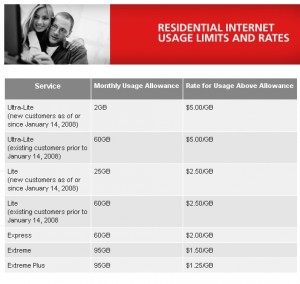
Gazing into our future, unless Internet Overcharging stops before it gets started (Photo: Sean McGrath)
Americans have a lot to learn. Our neighbors to the north have been living our broadband future, and it’s time to start paying attention.
Broadband providers that want to implement their Internet Overcharging schemes often claim that this isn’t unprecedented. People in Canada, Australia, New Zealand, and a few other countries already face a broadband service hobbled by arbitrary limits, and ‘you don’t hear them complaining.’
The Canadian broadband market is remarkably similar to our own. A very comfortable duopoly of providers – one cable operator and one telephone company provide the vast majority of Canadians with their Internet service. Several smaller independent providers, typically reselling access to Bell Canada’s network they’ve contracted to obtain at wholesale pricing, make up most of the rest.
Five years ago, those two providers clawed each other fighting for market share, and independent providers were popping up to provide more flexible broadband accounts for those looking for lower pricing or different speeds. Canada rose to second place in broadband among the 30 nations that belong to the Organization for Economic Cooperation and Development (OECD).
Evidently, the price and service war ended with a truce in the last 24 months. Then came the classic signs of Internet Overcharging: new restrictions and limits on usage, overlimit and penalty fees for exceeding those limits, a slowdown in competition to build better infrastructure offering higher speeds, and even “traffic shaping,” which in reality means artificially restricting selected services moving across a broadband network.

Rogers Internet Overcharging limbo dance reduces usage allowances on new customers. (click to enlarge)
Even more irritating for customers, rate increases accompanied all of these new restrictions. Rogers Cable, which helped get the ball rolling on Internet Overcharging schemes, raised broadband rates March 1st and then announced a “free speed upgrade” this past month, bringing their broadband speed in Toronto to 10Mbps for $45.26US per month, before taxes, with a 60GB limit and “traffic shaping.”
Customers looking for cheaper broadband from Rogers have been subjected to a reduction in the usage allowance since the Internet Overcharging schemes began. Now, customers looking for the least expensive plan pay $26.23US per month for 500kbps “broadband” with a usage limit of 2GB per month. Exceed that, and your overlimit penalty fee is an enormous $5.00CAD per gigabyte. When the first Internet Overcharging scheme was introduced, “lite” customers could use up to 60GB per month. It’s just more evidence that when broadband companies are allowed to implement Internet Overcharging schemes like this, the broadband limbo dance begins, with customers facing smaller and smaller “allowances” at the whim of the provider.
Rogers competition, primarily from Bell Canada, did what can be expected in a lightly competitive marketplace — they announced Internet Overcharging schemes of their own, trapping many Canadians into restrictive broadband service from every provider around.
Canadians hate the schemes, despite broadband industry propaganda that suggests customers didn’t mind paying more for less.
“Broadband in this country has completely stalled,” Stop the Cap! reader Brent, living near Ottawa wrote to us.
For several years, everything was heading in the right direction in Canada. Broadband service was extending from cities into smaller towns and communities, even in the Prairies, BC and Alberta, which have much more empty space between developed communities. Here in Ontario, Rogers and Bell are the dominant companies. It was bad enough when Rogers starting using traffic shaping to slow down things like peer to peer services, so you often find your speeds slowing down by half or more. Internet video is not as common in Canada because services like Hulu see the usage allowances and don’t bother to come here, because people can’t afford to watch them. But some independent producers do have online video, that they freely distribute using peer to peer. It’s throttled by Rogers, though, so it takes forever to load.
Then their cap came. We get 60GB per month on our service. I have a wife and two teenage daughters. Everyone is online here. Between all of us, 60GB is never enough, and we have to constantly watch them because they like to have friends over to do things on the computer together. We have to keep track of everything they do, and there are fights all of the time about who used what. You can never relax when you are online anymore, because you have to always be worried about what something might cost you.
Even worse, Rogers interferes with your service when you reach 75% of your allowance by injecting a warning banner on your web browser to tell you that you are approaching your limit for the month. That process forces their announcement onto web page after web page, and you’ll know it because half the time those pages with a warning banner take much longer to load, if they load properly at all. It doesn’t matter what page you are looking at, or who runs it. Rogers feels they can put their banner on it.
I spent two weeks in the States at a friend’s home who had Verizon FiOS and I couldn’t believe the difference. Using Canadian broadband and comparing it to Verizon FiOS is like the difference between dial-up service and the broadband service we used to have in this country.
Bell is now going to force limits on wholesale accounts as well. All of the independent companies that don’t currently have caps and allowances will now have to impose them, cutting off the last competitive choices we had. It’s a nice racket.
Reading the American papers, it’s all familiar to me. It’s the same things we were told.
- There are “Internet hogs” using “too much service” so we have to charge them more.
- We have to use the extra money to build better networks.
- We need to traffic shape to make sure everyone can use our service.
- It’s about fairness for everyone.
No. It’s about getting more money from you and pocketing it. The people they stereotype as “Internet hogs” turn out be ordinary families. Just because we may not know about some of the Internet cutting edge services becoming available, our kids do.
Canada’s providers aren’t using the all the extra money to build better networks, they are just treating them as profits. Our speeds are still slower than Americans get. They reduced the usage allowances on many people even further. They still traffic shape even on the networks they claim they were “improving.” Everyone’s Internet bill went up. Nobody is saving anything. There is nothing fair about duopoly pricing.

Dr. Michael Geist
Brent’s point about Bell Canada imposing Internet Overcharging schemes on their wholesale business accounts rings familiar. Earthlink wanted to sell its broadband Internet service that travels across Time Warner Cable’s lines at the current unlimited pricing they charge today. Whether they would be allowed to do so under TWC’s original Internet Overcharging proposal was highly doubtful.
Independent providers in Canada are upset about Bell Canada’s attempt to impose new limitations on their wholesale accounts, because it threatens their existence.
Two weeks ago, Dr. Michael Geist appeared before the Standing Committee on Transport and Communications to discuss the state of telecommunications in Canada.
Geist, a law professor at the University of Ottawa and noted expert on the state of Canadian broadband, called the developing situation in Canada “a crisis.”
Limiting competition and throwing your duopoly weight around has been a hallmark of insufficient oversight and regulatory control in under-competitive markets and Geist brought examples of providers engaged in mischief:
- Telus blocked access to a union supporting website during a labour dispute, blocking more than 600 other sites in the process
- Shaw advertised a $10 premium surcharge for customers using Internet telephony services opening the door to creating a competitive advantage over third party services
- Rogers currently degrades the performance of certain applications such as BitTorrent, widely used by software developers and independent film makers to distribute their work
- Bell openly throttles BitTorrent traffic, a practice that has been challenged before the CRTC

Bill St. Arnaud
Competition can provide some answers, but not all. It’s obvious new laws are required to put a stop to Internet Overcharging while real competition can develop.
As Stop the Cap! has documented, when fed-up municipalities reject their status as a “broadband backwater” and seek to deploy the advanced fiber networks that they need to spur economic growth and development, incumbent providers engage in lawsuits and delay tactics. But in many communities, in the end, the threat of municipal competition finally forces those networks to commit to the upgrades they refused to provide earlier.
Bill St. Arnaud, Chief Research Officer for CANARIE, ponders Canada’s future as the country slips further and further behind in OECD rankings because of the broadband duopoly in the country. Speaking with CBC Radio’s Nora Young, who hosts Spark, a twice-weekly radio program about technology and culture, he contemplates a solution to this problem that builds on the Obama Administration’s broadband stimulus program in the United States — by publicly funding an advanced “fiber to the home network” and then open it up to all providers to compete for customers.
Audio Clip: Bill St. Arnaud Appears on CBC Radio’s Spark – June 3, 2009 (11 minutes)
You must remain on this page to hear the clip, or you can download the clip and listen later.


 Subscribe
Subscribe Michael Lynton, Chairman and CEO of Sony Pictures Entertainment who was the subject of our
Michael Lynton, Chairman and CEO of Sony Pictures Entertainment who was the subject of our 

